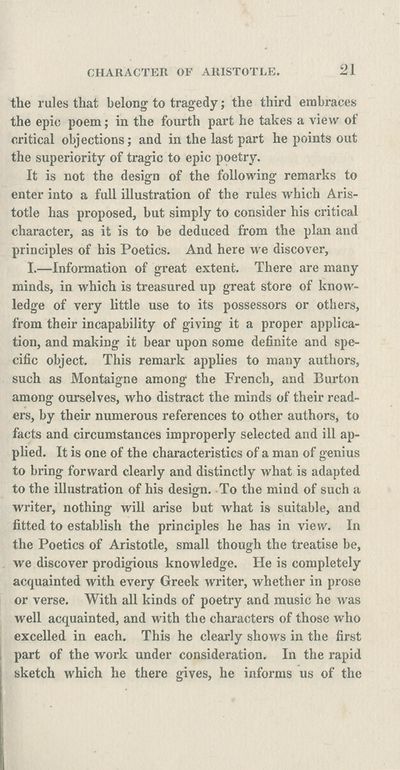Languages & literature > Athenaeum
(35)
Download files
Complete book:
Individual page:
Thumbnail gallery: Grid view | List view

CHARACTER OF ARISTOTLE.
2J
the rules that belong to tragedy; the third embraces
the epic poem; in the fourth part he takes a view ot
critical objections; and in the last part he points out
the superiority of tragic to epic poetry.
It is not the design of the following remarks to
enter into a full illustration of the rules which Aris¬
totle has proposed, but simply to consider his critical
character, as it is to be deduced from the plan and
principles of his Poetics. And here we discover,
I.—Information of great extent. There are many
minds, in which is treasured up great store of know¬
ledge of very little use to its possessors or others,
from their incapability of giving it a proper applica¬
tion, and making it bear upon some definite and spe¬
cific object. This remark applies to many authors,
such as Montaigne among the French, and Burton
among ourselves, who distract the minds of their read¬
ers, by their numerous references to other authors, to
facts and circumstances improperly selected and ill ap¬
plied. It is one of the characteristics of a man of genius
to bring forward clearly and distinctly what is adapted
to the illustration of his design. To the mind of such a
writer, nothing will arise but what is suitable, and
fitted to establish the principles he has in view. In
the Poetics of Aristotle, small though the treatise be,
we discover prodigious knowledge. He is completely
acquainted with every Greek writer, whether in prose
or verse. With all kinds of poetry and music he was
well acquainted, and with the characters of those who
excelled in each. This he clearly shows in the first
part of the work under consideration. In the rapid
sketch which he there gives, he informs us of the
2J
the rules that belong to tragedy; the third embraces
the epic poem; in the fourth part he takes a view ot
critical objections; and in the last part he points out
the superiority of tragic to epic poetry.
It is not the design of the following remarks to
enter into a full illustration of the rules which Aris¬
totle has proposed, but simply to consider his critical
character, as it is to be deduced from the plan and
principles of his Poetics. And here we discover,
I.—Information of great extent. There are many
minds, in which is treasured up great store of know¬
ledge of very little use to its possessors or others,
from their incapability of giving it a proper applica¬
tion, and making it bear upon some definite and spe¬
cific object. This remark applies to many authors,
such as Montaigne among the French, and Burton
among ourselves, who distract the minds of their read¬
ers, by their numerous references to other authors, to
facts and circumstances improperly selected and ill ap¬
plied. It is one of the characteristics of a man of genius
to bring forward clearly and distinctly what is adapted
to the illustration of his design. To the mind of such a
writer, nothing will arise but what is suitable, and
fitted to establish the principles he has in view. In
the Poetics of Aristotle, small though the treatise be,
we discover prodigious knowledge. He is completely
acquainted with every Greek writer, whether in prose
or verse. With all kinds of poetry and music he was
well acquainted, and with the characters of those who
excelled in each. This he clearly shows in the first
part of the work under consideration. In the rapid
sketch which he there gives, he informs us of the
Set display mode to:
![]() Universal Viewer |
Universal Viewer | ![]() Mirador |
Large image | Transcription
Mirador |
Large image | Transcription
| Antiquarian books of Scotland > Languages & literature > Athenaeum > (35) |
|---|
| Permanent URL | https://digital.nls.uk/108223503 |
|---|
| Description | Thousands of printed books from the Antiquarian Books of Scotland collection which dates from 1641 to the 1980s. The collection consists of 14,800 books which were published in Scotland or have a Scottish connection, e.g. through the author, printer or owner. Subjects covered include sport, education, diseases, adventure, occupations, Jacobites, politics and religion. Among the 29 languages represented are English, Gaelic, Italian, French, Russian and Swedish. |
|---|

